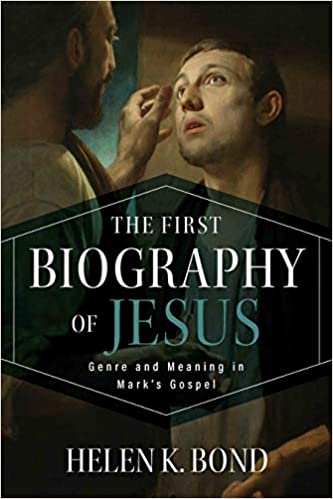Helen Bond is a first rate Gospel scholar who has published important monographs on Pontius Pilate and Caiaphas among other helpful studies. Her most recent book entitled ‘The First Biography of Jesus‘ makes a detailed case that we must read Mark’s Gospels in light of ancient biographies and their conventions, as Mark’s Gospel fits well in that genre. Bond builds on the earlier important work of Richard Burridge among other NT scholars, but what really distinguished this work is Bond’s very detailed interaction with the work of classics scholars and scholars of ancient history who have studied ancient biographies and historical monographs in great detail. Sadly, it has not always been the case that NT scholars have done enough work in the primary sources on Greco-Roman literature to know whether meaningful comparisons can be made, and essential things learned from the comparisons. Bond makes it beyond reasonable doubt that if one really wants to understand the sort of literature Mark’s Gospel is, one must situate it in the context of ancient Greco-Roman biographies. This makes good sense, especially if Mark was written from and for a Roman audience during the last third of the first century A.D.
The book begins with a Forschungsberichte, which is to say a review of the discussion of the genre of Mark over the course of the last century or so. This is helpful, especially in its critique of the way 20th century form criticism approached the matter, not to mention all sorts of scholars who wrongly suggested that Mark’s Gospel was sui generis— a unique form of literature. Bond carefully and persuasively shows how this approach simply does not account for the data. Bond shows how Mark uses chreia and synkrisis, two important rhetorical devices like other ancient biographers of that era to structure his Jesus material. Furthermore, she is right that ancient biographers focused on the character of the central figure, usually with the aim of urging imitation of the virtues of the ‘hero’ of the tale. One upshot of this insight is that Bond thinks it is not likely that other figures in the tale, such as Peter or Judas or minor characters like Bartimaeus are meant to also be seen as exemplars Mark’s audience. No— their portrayal is merely meant to provide a sort of backdrop or even contrast with Jesus, who is the sole entirely positive figure in the whole Gospel. This point of view can be pushed too far, since especially in the case of Peter we find a person who is portrayed as having both positive and negative traits or behaviors. And by the same token, Jesus can only be an exemplar for disciples up to a point— since they can only be followers of Jesus. They can’t be messiahs or persons who atone for the sins of the many. But Bond recognizes this and provides a nuanced reading of the data.
This is an important study, well written, well researched, but of course there are some things that can be seen as shortcomings. For one thing, Bond doesn’t really recognize that a major structuring device for this Gospel is Mark’s theology, with the first half of the Gospel raising questions about who Jesus is, a question answered in Mark 8, after which, and only after which are we told in three straight chapters what Jesus’ mission is— to suffer many things, be killed and on the third day rise (in Mark 8-10–see my Gospel of Mark volume for Eerdmans) and only after do we have the Passion narrative, the tale of how Jesus’ life mission was accomplished. Furthermore, her treatment of Mark 16, assumed to be the original ending at 16.8 simply doesn’t work as an ending to a positive ancient biography. She admits that there is no parallel in the ancient biography corpus for an ending like that. And then there are the problems with analyzing ancient biographies as if they followed exactly the same conventions as the writing of ancient works of fiction such as ancient novels or romances. For example, talking about omniscient narrators or plot design or minor actors in the story can be overdone when we are in fact dealing with historical persons and historical events. But none of this takes away for what a good volume this is, and I would hope it will be widely read and be allowed to have the effect it deserves to have on the issue of whether Mark is an ancient biography or not, and what difference that makes in the interpretation of Mark’s meaning and purpose in writing the first ‘life of Jesus’.













